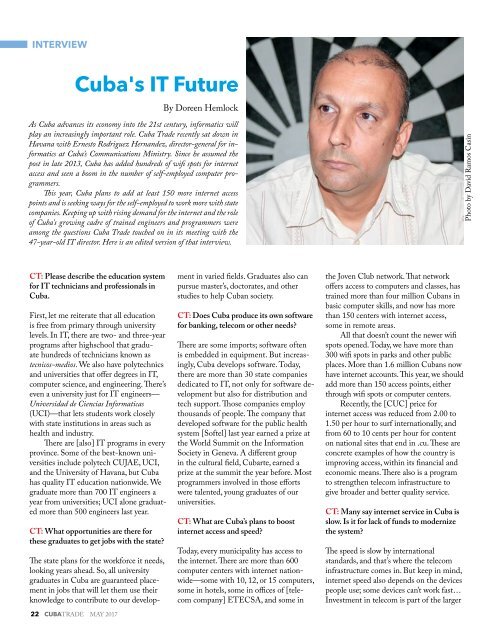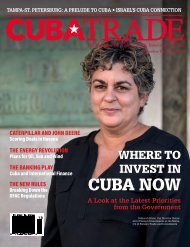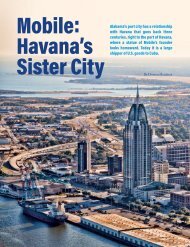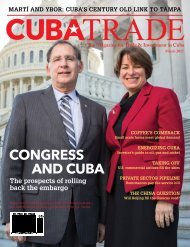CubaTrade-May2017-Flipbook
You also want an ePaper? Increase the reach of your titles
YUMPU automatically turns print PDFs into web optimized ePapers that Google loves.
INTERVIEW<br />
22 CUBATRADE MAY 2017<br />
Cuba's IT Future<br />
CT: Please describe the education system<br />
for IT technicians and professionals in<br />
Cuba.<br />
First, let me reiterate that all education<br />
is free from primary through university<br />
levels. In IT, there are two- and three-year<br />
programs after highschool that graduate<br />
hundreds of technicians known as<br />
tecnicos-medios. We also have polytechnics<br />
and universities that offer degrees in IT,<br />
computer science, and engineering. There’s<br />
even a university just for IT engineers––<br />
Universidad de Ciencias Informaticas<br />
(UCI)––that lets students work closely<br />
with state institutions in areas such as<br />
health and industry.<br />
There are [also] IT programs in every<br />
province. Some of the best-known universities<br />
include polytech CUJAE, UCI,<br />
and the University of Havana, but Cuba<br />
has quality IT education nationwide. We<br />
graduate more than 700 IT engineers a<br />
year from universities; UCI alone graduated<br />
more than 500 engineers last year.<br />
CT: What opportunities are there for<br />
these graduates to get jobs with the state?<br />
By Doreen Hemlock<br />
As Cuba advances its economy into the 21st century, informatics will<br />
play an increasingly important role. Cuba Trade recently sat down in<br />
Havana with Ernesto Rodriguez Hernandez, director-general for informatics<br />
at Cuba’s Communications Ministry. Since he assumed the<br />
post in late 2013, Cuba has added hundreds of wifi spots for internet<br />
access and seen a boom in the number of self-employed computer programmers.<br />
This year, Cuba plans to add at least 150 more internet access<br />
points and is seeking ways for the self-employed to work more with state<br />
companies. Keeping up with rising demand for the internet and the role<br />
of Cuba's growing cadre of trained engineers and programmers were<br />
among the questions Cuba Trade touched on in its meeting with the<br />
47-year-old IT director. Here is an edited version of that interview.<br />
The state plans for the workforce it needs,<br />
looking years ahead. So, all university<br />
graduates in Cuba are guaranteed placement<br />
in jobs that will let them use their<br />
knowledge to contribute to our development<br />
in varied fields. Graduates also can<br />
pursue master’s, doctorates, and other<br />
studies to help Cuban society.<br />
CT: Does Cuba produce its own software<br />
for banking, telecom or other needs?<br />
There are some imports; software often<br />
is embedded in equipment. But increasingly,<br />
Cuba develops software. Today,<br />
there are more than 30 state companies<br />
dedicated to IT, not only for software development<br />
but also for distribution and<br />
tech support. Those companies employ<br />
thousands of people. The company that<br />
developed software for the public health<br />
system [Softel] last year earned a prize at<br />
the World Summit on the Information<br />
Society in Geneva. A different group<br />
in the cultural field, Cubarte, earned a<br />
prize at the summit the year before. Most<br />
programmers involved in those efforts<br />
were talented, young graduates of our<br />
universities.<br />
CT: What are Cuba’s plans to boost<br />
internet access and speed?<br />
Today, every municipality has access to<br />
the internet. There are more than 600<br />
computer centers with internet nationwide—some<br />
with 10, 12, or 15 computers,<br />
some in hotels, some in offices of [telecom<br />
company] ETECSA, and some in<br />
the Joven Club network. That network<br />
offers access to computers and classes, has<br />
trained more than four million Cubans in<br />
basic computer skills, and now has more<br />
than 150 centers with internet access,<br />
some in remote areas.<br />
All that doesn’t count the newer wifi<br />
spots opened. Today, we have more than<br />
300 wifi spots in parks and other public<br />
places. More than 1.6 million Cubans now<br />
have internet accounts. This year, we should<br />
add more than 150 access points, either<br />
through wifi spots or computer centers.<br />
Recently, the [CUC] price for<br />
internet access was reduced from 2.00 to<br />
1.50 per hour to surf internationally, and<br />
from 60 to 10 cents per hour for content<br />
on national sites that end in .cu. These are<br />
concrete examples of how the country is<br />
improving access, within its financial and<br />
economic means. There also is a program<br />
to strengthen telecom infrastructure to<br />
give broader and better quality service.<br />
CT: Many say internet service in Cuba is<br />
slow. Is it for lack of funds to modernize<br />
the system?<br />
The speed is slow by international<br />
standards, and that’s where the telecom<br />
infrastructure comes in. But keep in mind,<br />
internet speed also depends on the devices<br />
people use; some devices can’t work fast…<br />
Investment in telecom is part of the larger<br />
Photo by David Ramos Casin<br />
Having Trouble Finding<br />
a Hotel In Havana?<br />
Why Not See It Like a Native?<br />
Our apartments are in the Old Plaza (La Plaza<br />
Vieja) in the heart of Old Havana. Here, visitors can<br />
discover and get to know Cuba by walking the<br />
streets of its centuries-old capital—and feeling at<br />
home being taken care of by a friendly Cuban host.<br />
• Accommodations for two, four or six people.<br />
• Reasonable rates. Breakfast included.<br />
Contact Maylu Hernandez at<br />
maylu21@hotmail.com for availability and rates.
















